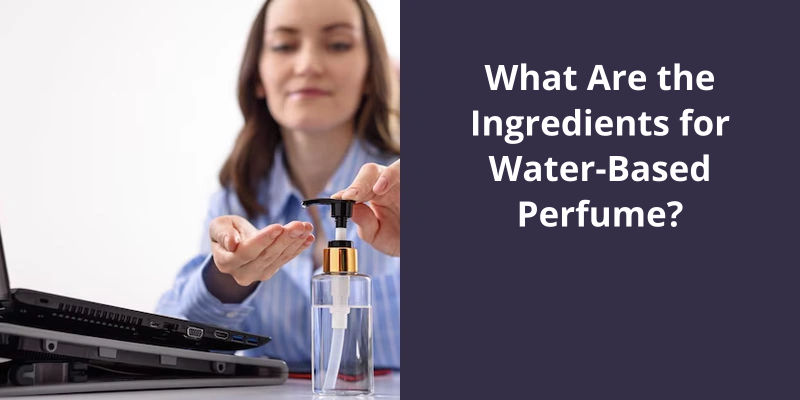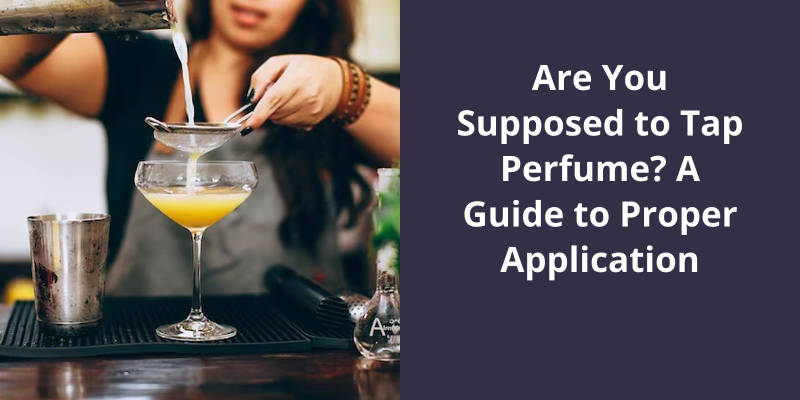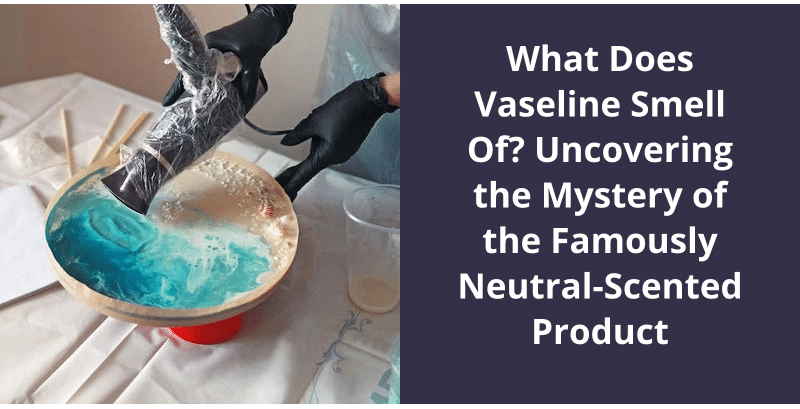Water-based perfume predominantly includes three main ingredients: distilled water, essential oils, and a solubilizer. Distilled water acts as the primary carrier for the scent. Essential oils, derived from various plants, flowers, or fruits, provide the unique and diverse fragrances specific to each perfume. A solubilizer, such as polysorbate 20, helps in blending the water and oil together for a homogeneous mix. It’s important to note that proportions of these ingredients may vary to achieve the desired strength of fragrance. After combining these components, the mixture is often left to settle for a few days to allow the scent to fully develop.

What Is Water Based Fragrance?
Water-based fragrances have become increasingly popular over the years as more and more people are turning towards eco-friendly and organic products. Unlike alcohol-based perfumes, water-based fragrances don’t contain any synthetic or toxic chemicals, making them a safe and gentle option.
Since they don’t contain alcohol, water-based perfumes don’t evaporate as quickly as alcohol-based ones. This means that the fragrance lasts longer on your skin, and you don’t need to reapply it as often. Furthermore, water-based fragrances are less likely to stain clothes, making them perfect for daily use.
They’re gentle on the skin, long-lasting, and versatile, making them an excellent choice for people of all ages.
Creating your own signature scent can be a fun and rewarding experience. With just a few simple ingredients, you can make perfume from scratch that’s uniquely tailored to your preferences. In this article, we’ll provide a step-by-step recipe to help you create a perfect perfume that’s both fragrant and long-lasting. So, grab your carrier oil, alcohol, essential oils, and let’s get started!
How to Make Perfume From Scratch?
Creating your own perfume from scratch can be an exciting and fulfilling experience. The process can be daunting at first, but once you’ve the right ingredients and tools, it can be a breeze. To start, you’ll need 2 tablespoons of carrier oil, such as sweet almond, coconut, or jojoba. These oils serve as the base for your perfume and help to dilute the essential oils that will give your perfume it’s unique aroma.
Next, you’ll need 6 tablespoons of 100-proof alcohol to act as a preservative for your perfume. The alcohol also helps to blend the oils together to create a more balanced scent. It’s important to use 100-proof alcohol as anything less could result in a weak and ineffective perfume.
To add a bit of hydration to your perfume, you’ll also need 2.5 tablespoons of bottled water. This water will help to balance out the oils and alcohol and give your perfume a longer shelf life.
Now for the fun part, selecting your essential oils. Essential oils are what give your perfume it’s scent and can be a combination of top notes, middle notes, and base notes. Top notes are the scents you smell first and are often described as fresh and zesty, while middle notes are heavier scents that last longer on the skin. Base notes are often described as warm and musky and can include scents like sandalwood and vanilla.
To create your perfume, you’ll need to mix 30 drops of essential oils. Aim for 9 drops of top notes, 15 drops of middle notes, and 6 drops of base notes. You can experiment with different combinations of oils to create the perfect scent that’s uniquely yours.
To filter and transfer your perfume into bottles, you’ll need a coffee filter and a small funnel. Fold the coffee filter into a small cone and place it over the mouth of one of the dark-glass bottles. Slowly pour the mixture through the filter and into the bottle using the funnel. Repeat the process with the second bottle.
The final step in making your own perfume is to label the bottles and store them in a cool, dark place. The perfume will need to sit for at least 24 hours to allow the oils to blend together and the scent to mature. Once it’s had time to sit, you can finally enjoy the sweet smell of success and wear your new signature scent with pride.
Now that we’ve learned what water-soluble fragrances are, it’s important to understand their benefits for creating a variety of water-based products. Unlike other synthetic fragrances, these fragrances don’t require any additional solubilization before use. This makes them a convenient and cost-effective option for manufacturers looking to create high-quality products with consistent scents. In this article, we’ll explore the advantages of using water-soluble fragrances and how they can enhance your product formulations.
What Are Water Soluble Fragrances?
Water-soluble fragrances are becoming increasingly popular in the fragrance industry as they allow for the creation of a wide range of products that are easy to use and have a lasting scent. From body washes to face mists, these fragrances are versatile and can be used in a variety of settings. They’re perfect for creating customized fragrances that can be used as a signature scent, or as part of a specific product line.
For consumers, these fragrances provide a long-lasting scent that can be used in a variety of products, without the need for a heavy or oily texture. They’re also more easily absorbed into the skin, providing a more subtle and natural scent. For manufacturers, these fragrances are easier to work with and can be used in a wider range of products, which can help to increase sales and profits.
They provide a wide range of benefits for both consumers and manufacturers, and can be used in a variety of products without the need for additional solubilizers. With their versatility, safety, and ease of use, they’re sure to remain a popular choice for years to come.
If you’re someone who loves to wear fragrances but hates the idea of them fading away quickly, you should know that oil-based perfumes may hold the answer to your problems. Not only do these types of perfumes have a longer-lasting scent, but they also offer several other benefits that you might not have considered before. Read on to learn more about the advantages of oil-based perfumes and why you might want to give them a try.
What Are the Benefits of Oil-Based Perfume?
When it comes to perfumes, there are a wide variety of options available on the market. One of the popular choices is oil-based perfumes, which offer a variety of benefits. Unlike alcohol-based perfumes, which can evaporate quickly, oil-based perfumes tend to have a longer-lasting fragrance. This means that you can enjoy the scent for longer periods of time without having to reapply it frequently. This makes them ideal for those who want a fragrance that lasts throughout the day.
Alcohol-based perfumes can sometimes cause irritation or drying of the skin, which can be particularly problematic for those with sensitive skin. Oil-based perfumes, on the other hand, have a gentler formula that’s less likely to irritate the skin. This makes them a better choice for those who’ve skin sensitivities or allergies.
One of the main drawbacks of alcohol-based perfumes is that they can leave an alcohol smell behind. This can be distracting or overpowering, and it can even interfere with the fragrance of the perfume itself. They’ve a more subtle fragrance that doesn’t leave behind any unpleasant alcohol odor.
Oil-based perfumes, however, are safe to use on hair and clothes, which makes them a versatile option. You can add a subtle fragrance to your clothes or hair without worrying about damaging them.
This is because natural essential oils are an important component of the formula. These oils are often extracted from plants, which means that they’re less likely to contain synthetic chemicals or artificial fragrances.
They’ve a longer-lasting fragrance, are better for sensitive skin, don’t leave behind an alcohol smell, can be used on hair and clothes, and are often made with more natural ingredients.
How to Properly Apply Oil-Based Perfume
- Apply perfume after showering and moisturizing your skin.
- Choose the right spots on your body to apply perfume. Popular options include the wrists, neck, inner elbow, behind the knees, and cleavage.
- Hold the perfume bottle a few inches away from your skin and spray the perfume directly onto the chosen areas.
- Avoid rubbing the perfume into your skin, as this can alter the scent.
- For a subtler effect, spray the perfume into the air and walk through the mist.
Conclusion
This process ensures that the fragrance remains long-lasting and lasts as long as it’s alcohol-based counterparts. Furthermore, water-based perfumes are also more environmentally friendly, as they don't contain any harmful substances that could negatively impact the environment.





